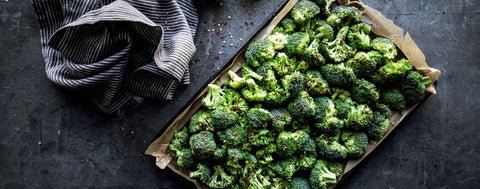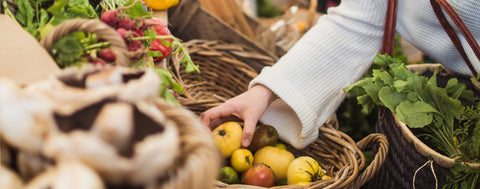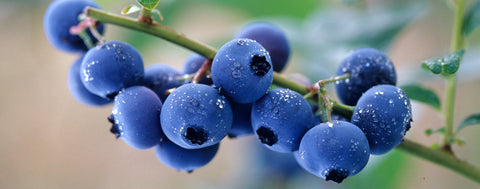Over the past few years “superfoods” has been a bit of a buzzword in the health industry. There always seems to be new trendy superfoods taking the media by storm, but what even is a superfood?
There is no one agreed upon definition of a superfood. It is not a term used by doctors, scientists, dietitians, nutritionists; instead, it’s more of a marketing tool used by the media.
As a Registered Clinical Nutritionist, my definition of a superfood is food which offers a high nutrient profile, meaning that certain foods pack a mighty punch when it comes to their vitamin, mineral and phytochemical content. There is no need to get caught up in the hype of packaged “superfoods.” Instead, emphasize a wholefoods diet.
The goal here is to keep thing simple. Simplicity is always key; it’s also something I teach my clients about in clinic. Too often I see people overcomplicate healthy eating, this can make eating well more challenging and more stressful, but it doesn’t have to be this way.
With the new year being upon us and intention settings being set high it’s a great time to emphasize a healthy, balanced diet that’s full of delicious whole foods that will nourish your body, doesn’t have to break the bank or include overloading your smoothie with all these different powders you can’t even pronounce.
So, what should you do? Well, you probably already have several “superfoods” in your kitchen, so have a read of the list below and start to add these nutrient-dense whole foods to your daily diet to enhance your health.
My top 10 Superfoods:
- Lemon - high in vitamin C which is an antioxidant, helps protect against free-radicals, supports adrenal health, immune health. Add the juice from ½ a lemon to a glass of water upon waking to help alkalize your body and help flush your livers pathways.
- Spinach - a great source of minerals making it well known for bone health. High in vitamin A, C, K, folate, antioxidants, iron, calcium, manganese, magnesium.
- Kale – a fibre rich dark leafy green vegetable rich in vitamin A, K, B vitamins, manganese, calcium, and potassium.
- Garlic – has antimicrobial, antibacterial, and antiviral benefits. It contains antioxidants and selenium. Garlic has also been shown to help decrease overall cholesterol and triglycerides.
- Broccoli – a good source of vitamin C, K, some B-vitamins, fibre and antioxidants. It contains fiber compounds that bind to bile acids in our digestive systems, which ultimately help to lower cholesterol, especially when cooked (which is how I recommend to enjoy it). It also contains sulforaphane which helps to provide an extra boost in detoxification of our liver’s pathways.
- Avocado – this fruit is indeed a beauty and “superfood” due to their vitamin E, healthy fat content and are high in fibre.
- Quinoa – a gluten-free grain (technically a seed) which is a good source of protein, fibre, and B-vitamins which is good for our liver and adrenal health.
- Brazil nuts – the best food source of selenium which is essential for thyroid health, DNA synthesis, reproduction, and antioxidant protection. Also high in copper, manganese, magnesium, phosphorus and healthy fats.
- Blueberries - have been shown to help with cardiovascular health, cognitive benefits, eye health, overall antioxidant support, insulin resistance, and have anti-cancer benefits. Because blueberries contain a significant amount of fiber and they’re lower in sugar than other fruits. They are a good source of vitamin K, C, manganese.
- Sweet potato – high in vitamin A, C, manganese. They are an easy to digest carbohydrate which is fibre to help support bowel health and manage blood sugars. They also contain antioxidants!
Other fantastic superfoods include eggs, salmon, beetroot, carrot, pumpkin, walnuts, almonds, lentils. There are so many to choose from!
“Superfoods” which are thrown about in the media are amazing additions to your diet, but should never replace real wholefoods. If you are interested in an additional boost to your diet I have included two of my favourite superfoods below;
- Lifestream Spirulina
- Nuzest Good Green Stuff
Written by Natalie Brady
References
- Nutrition Data. Lemons, raw without peel. 2019. Available from https://nutritiondata.self.com/facts/fruits-and-fruit-juices/1936/2
- Nutrition Data. New Zealand spinach, raw. 2019. Available from https://nutritiondata.self.com/facts/vegetables-and-vegetable-products/2495/2
- Nutrition Data. Kale, raw. 2019. Available from https://nutritiondata.self.com/facts/vegetables-and-vegetable-products/2461/2
- Nutrition Data. Garlic, raw. 2019. Available from https://nutritiondata.self.com/facts/vegetables-and-vegetable-products/2446/2
- Nutrition Data. Broccoli, cooked, boiled, drained. 2019. Available from https://nutritiondata.self.com/facts/vegetables-and-vegetable-products/2357/2
- Nutrition Data. Avocado. 2019. Available from https://nutritiondata.self.com/facts/fruits-and-fruit-juices/1843/2
- Nutrition Data. Quinoa, cooked. 2019. Available from https://nutritiondata.self.com/facts/cereal-grains-and-pasta/10352/2
- Nutrition Data. Nuts, brazil nuts, dried unblanced. 2019. Available from https://nutritiondata.self.com/facts/nut-and-seed-products/3091/2
- Nutrition Data. Blueberries, raw. 2019. Available from https://nutritiondata.self.com/facts/fruits-and-fruit-juices/1851/2
- Nutrition Data. Sweet Potato, cooked, baked in skin, without salt. 2019. Available from https://nutritiondata.self.com/facts/vegetables-and-vegetable-products/2667/2



